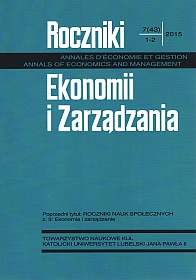Selected Aspects of the Employment Policy in West Germany in the Post-War Period
Abstract
In the Federal Republic of Germany of the post-war period the educational system had major deficiencies while the employment structure was in line with the general trend. The labour market under recession was among the best. Given a low unemployment rate, relatively high unemployment benefits combined with a low inflation rate all provided the jobless with a decent living standard. Highly qualified workers and modern work methods allowed the country to grow its GDP quickly. Work efficiency in West Germany played a superior role among other economic factors. The reliance on work efficiency as a vehicle for increased national income was the mainstay of the strategy of economic growth. The increasing importance of modern technologies and a desire to maintain a high growth rate in the future forced the governments of capitalist countries to make up for educational deficiencies of previous years. Most of the capitalist countries managed to achieve that in a relatively short period of time while West Germany dealt with this issue quite late, i.e. only in the late 1960s and early 1970s.
References
Bericht über die Entwicklung der sozialen Lage in der Gemeinschaft, Brüssel–Luxemburg EWG: 1975.
Bittere Lektion – aus dem OECD Rapport über das deutsche Bildungswesen, „Die Zeit” 1971, Nr. 50.
Bundesanstalt für Arbeit, Auslandische Arbeitsnehmer, Erfahrungsbericht 1972.
Decyzje ekonomiczne Rządu RFN, „Rynki Zagraniczne” 1974.
Echterhoff-Severitt H.: Bildung und Forschung im internationalen Vergleich, Frankfurt a. M. 1970.
Economic Growth, Paris: OECD 1971.
Economic Growth, Paris: OECD 1975.
Horning K.: Der neue Arbeiter, Frankfurt a. M.: Fischer Verlag 1973.
Iwanow N.P.: Rewolucja naukowo-techniczna a kształcenie kadr w rozwiniętych krajach kapitalistycznych, Warszawa: WSiP 1974.
Klee E., Gastarbeiter – Analysen und Berichte, Frankfurt a. M.: Suhrkamp Verlag 1972.
Leistung in Zahlen, Bonn: BMWI 1973.
Leistungen in Zahlen, Bonn: BMWI 1972.
Leistungen in Zahlen, Bonn: BMWI 1975.
Neller W.: Grundlagen und Hauptergebnisse der Statistik „Die Vertriebenen in Deutschland” 1959.
Nowak Z.: Zarys czynników rozwoju gospodarczego Niemiec Zachodnich, Poznań 1960.
NRF rozważa zmiany w polityce gospodarczej, „Rynki Zagraniczne” 1975.
Pohle W., Lutze H.: Marktwirtschaft als Program, München 1974.
Pohle W., Lutze H.: Marktwirtschaft als Programm, München 1974.
Prager T.: Wirtschaftswunder, Wien 1966.
Problemy strukturalne w RFN, „Rynki Zagraniczne” 1974.
Program ożywienia koniunktury w RFN, „Rynki Zagraniczne” 1975, nr 148.
„Rocznik Statystyczny” 1975.
Rogalski A.: NRF – elementy rzeczywistości, Poznań 1974.
Schulz T.W.: Education and Economic Growth, Paris 1968.
Sosnowski T.: Tendencje rozwojowe szkolnictwa zawodowego w krajach rozwiniętych gospodarczo, Warszawa: CINTE WIT 1975, nr 25.
Strajki w przemyśle metalowym NRF, „Rynki Zagraniczne” 1975.
Sytuacja na rynku pracy w RFN pogarsza się, „Rynki Zagraniczne” 1975, nr 14.
Sytuacja na rynku pracy w RFN pogarsza się, „Rynki Zagraniczne” 1975, nr 151.
Taschenbuch für Wirtschaft, Hamburg: Deutsche Industieverlag GMbH 1965.
Tatsachen über Deutschland, Bonn 1972.
Thomas H.: Zum Zusammenhang der Schulstufen, „Frankfurter Hefte” 1975, Nr. 4.
Tomala M.: Polska-RFN, gospodarka, stosunki ekonomiczne, Poznań: Instytut Zachodni 1970.
Vester F.: Aspekte der Bundesdeutschen Forschung, Bonn 1975.
Wzrost bezrobocia we Wspólnym Rynku, „Rynki Zagraniczne” 1975, nr 144.
Zahlenkompass, München: Verlag Kohlmacher 1975.
Copyright (c) 2015 Roczniki Ekonomii i Zarządzania

This work is licensed under a Creative Commons Attribution-NonCommercial-NoDerivatives 4.0 International License.


